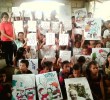May 02, 2012
‘K12 creates a generation of youths deployable for labor export’ – Librado
The United Nations Educational, Scientific and Cultural Organization (UNESCO) and the International Commission on Education for the 21st century recommend that at least six (6) percent of a country’s gross domestic product (GDP) be allocated to education. Unfortunately, the education sector’s share only ranges from 2.5 to 3% of the GDP. This is drastically lower than our neighboring countries’ fund for education. For instance, Brunei allots 9.1% of its GDP for education while Malaysia allots 8.1% and Thailand gives 5.2%.
Notwithstanding the many indicators that show the quality of education in the Philippines is deteriorating, the government continues to follow prescriptions from its foreign creditors to systematically reduce support for education, among other social services, in order to reduce the government’s budget deficit while ensuring continued debt servicing which eats up the most monstrous share of the government’s annual budget.
A perusal of the K12 proposes that it is a major education reform program which extends basic education from 10 to 12 years to better prepare students for the world of work, higher education and global employment. K+12 also calls for the declogging of the curriculum and the inclusion of various career tracks that students can choose from depending on their inclination.
K+12 starts with kindergarten which becomes mandatory for all 5-year olds in public schools starting June this year. This will be followed by 6 years of elementary school, four years of junior or regular high school and two years of senior high school where students will be given various career/livelihood tracks for their mastery.
But almost 45 percent of the jobless youth are in fact, either college level or graduates. Yet, the Worldbank cited in their study that the country has the largest number of unemployed youth in the East Asia and in the Pacific region. Young Filipino workers are twice as likely to be unemployed than those in older age groups as they figure in the annual average of at least 300,000 new graduates that add up to the labor force.
Even teachers are facing troubles as they are greatly underpaid for all of their work.
Thus, K+12 only equates to reinforcing labor export policy (LEP). We can claim that the mere purpose of K+12 is to create a generation of educated youth who are immediately deployable for labor export.
If the program can truly help a lot of students to get a job and will eventually produce employment for a nationalized industry in our own country, then it is alright but it is clear that this is NOT being done. This K to 12, is being designed precisely to boost globalization- a scheme that liberalizes, privatizes and deregulates our country’s basic services for the interests of the giant capitalist countries.
The plan for K+12 is not to merely provide higher education opportunities to the youth, but to create an army of semi-skilled labor forces for immediate employment abroad.
I am also pointing out the massive unemployment in the country because this reflects the economic status of many Filipino families we can see all around where the top priority is how to survive their daily food sustenance.
Our national budget is insufficient to sustain a “full blown” program such as K+12 and the additional two years in high school; the mandatory “Universal Kindergarten” is not the answer if Pres. Aquino is truly interested in fixing the education system.
K+12 program of DepEd is not yet needed in the system of education in the country. Instead, there is a need to train students to become experts to serve our own economy and not to work abroad. (Atty. Leah A. Librado, SP Committee Chair on Education, Science and Technology, Culture and Arts)
[box type=”info”] IMPORTANT NOTICE: INBOX is an archive of press releases, statements, announcements, letters to the editors, and manifestos sent to Davao Today for publication. Please email your materials to davaotoday@gmail.com. Davao Today is not responsible for the content of these materials. The opinion expessed in these items does not reflect those of Davao Today and its staff. Please refer to our terms of use/disclaimer.[/box]










